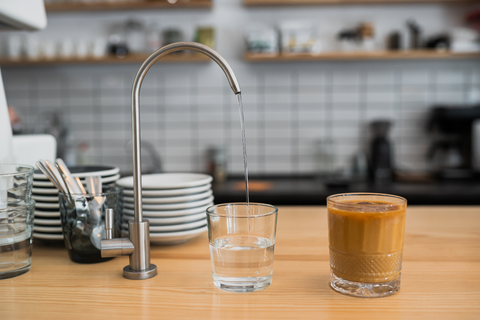When it comes to brewing a great cup of coffee at home, many of us focus on the beans, the grind, and the equipment. But did you know that water makes up about 98% of your coffee? That’s why getting your water right is key to unlocking the full flavor of your beans.
In this guide, we’ll explore what makes water ideal for coffee brewing, how different water types can change the taste, and some easy ways to make sure your water is helping, not hurting, your coffee.
1. Why water quality matters in coffee
Good water doesn’t just dissolve the coffee grounds — it actually extracts flavors, oils, and aromas. The minerals in your water, like calcium and magnesium, play a big role in this process. Too few minerals, and your coffee might taste flat; too many, and it can end up tasting dull or overly bitter. Striking the right balance can enhance sweetness, clarity, and complexity in every cup.
2. The ideal mineral balance
The Specialty Coffee Association recommends water with a certain mineral content for the best extraction:
- Calcium and Magnesium: These help draw out the coffee’s flavors, especially its sweetness and acidity.
- Bicarbonate: Helps balance the pH but can lead to dullness if levels are too high.
If you’re serious about brewing, look for bottled water with no odour or colour; zero chlorine; a pH of 7.0; alkalinity of 40 ppm; and calcium hardness of 50-175 ppm CaCO3(The Specialty Coffee Association's water standards) or use a home filter that reduces excess minerals without stripping water completely.
3. Filtered vs. Distilled vs. Tap Water
Each type of water will give your coffee a unique taste. Here’s a quick breakdown:
- Filtered Water: A great option for home brewing, filtered water removes unwanted chemicals like chlorine while retaining a balanced mineral profile.
- Distilled Water: Avoid using distilled water for coffee as it lacks the minerals needed for flavor extraction, leading to bland and overly acidic coffee.
- Tap Water: Depending on where you live, tap water can be good for coffee or too mineral-heavy. If you’re using tap water, consider a simple filter to remove chlorine or unwanted tastes.
4. Filtering options for home brewers
There are several options for ensuring you’re using high-quality water:
- Activated charcoal filters: Easy to use and affordable, these filters help reduce chlorine and other impurities in tap water.
- Water pitcher filters: A popular choice for home brewers, they’re easy to use and often effective at balancing out water minerals.
- Dedicated coffee filters: Some companies offer filters specifically designed for coffee, ensuring an ideal mineral balance.
5. Hard water, soft water and taste differences
If your water is too “hard” (high in minerals), it can leave your coffee tasting overly bitter. On the other hand, water that’s too “soft” might produce a sour or flat taste. Testing your water or experimenting with bottled water options can help you find a perfect balance for your home brewing.
6. Quick tips for perfect water every time
- Use fresh, cold water each time you brew.
- Avoid reboiling water, which can concentrate minerals.
- Store filtered water in a clean container to avoid picking up fridge odors.
By taking a few simple steps, you can make sure your water is always ready to bring out the best in your coffee.
Ready to Start Brewing?
With the right water, you’re well on your way to mastering the art of home brewing. Each time you fill your kettle, you’re making a choice that affects every sip of coffee — so make it a good one!
Read More:
- One easy Tip for a Perfect Brew: Using Soft Water , Difference
-
Demystifying Water for Coffee Scott Rao – for more in-depth information
Scott Rao is a coffee expert and author specializing in cafe operation, barista training, and coffee roasting and brewing.



